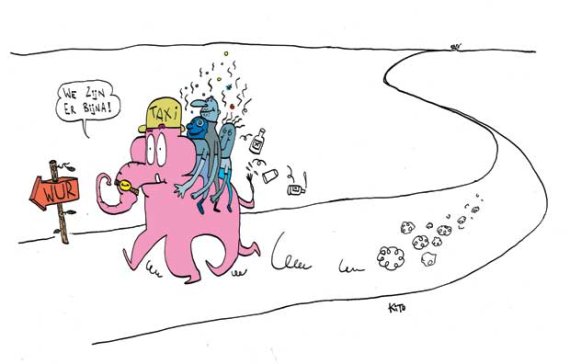The hard cut-off point between Bachelor’s and Master’s, the abolition of the basic student grant, a fine on slow students and perhaps making course advice binding … all these clouds are hanging over Dutch students’ heads. Even though the new boards of the Wageningen student societies Ceres, KSV Franciscus and SSR-W have only just taken over, the board members are already racking their brains for ways of supporting their members through their degree programmes. Even though it only becomes clear after the inauguration period exactly how many first-years really are joining the clubs, none of the three societies has cause to complain about recruitment figures. ‘But during the AID we could see that the new students are more doubtful about whether they can combine their studies with society life, because of all the government measures’, says Robbert Hoeboer, secretary at KSV. ‘It is clear that their studies come first.’ Ceres president Zeger Kievit confirms this. ‘We are growing, but not as fast as the university.’ He sees this as the writing on the wall. ‘It is becoming harder to find a balance between studying and really being a student. Students are taking both their courses and their extracurricular activities more seriously. If there are still people walking around who are in their eighth or ninth year as students, they are really behind the times.’ SSR-W, which used to be a minor player among the student societies, has been growing apace for years. But that growth will come to a halt if the society concentrates exclusively on parties and fun, believes the new chair Evelien Valk. ‘A student society is nice but in the end your degree programme is the most important thing. A society can only go on running if the members keep coming. So you automatically bear in mind their commitments.’ Study breakfast At both SSR-W and KSV, members regularly meet to study together, say Hoeboer and Valk. The societies’ premises have enough rooms for students to find a place to study quietly if they don’t feel like sitting alone at home with their books. This coming year the boards are going to see what other needs there are. KSV is pondering the idea of mentors and a rotation system for books. SSR-W expects that the study committee will become more and more important. ‘That committee manages the "trade" in secondhand books, exams and summaries, and organizes "degree programme dinners" in which students from different years on the same programme can exchange tips and books and pass on knowledge during a meal together. But we expect the committee to become even more active. By giving workshops for example.’ The name of the game is changing at Ceres too. Kievit: ‘Of course we are a social club. But one of our tasks is also to offer our members a bit more than just beer-drinking.’ Last year the society launched a study breakfast. During revision weeks members could come along to the bar between 8.00 and 9.30 for a simple breakfast, after which they would get started on their revision at a decent time. Kievit: ‘An excuse you hear a lot is: "I do want to study but I cannot manage to get myself to the university before 12 o’clock." The breakfast worked like a carrot. There were always about 40 people at it, so it clearly fulfilled a need.’ The society is also considering running a course on study skills. ‘Talks are going on with KSV about that, but it is still very early days. We first need to check all the possibilities.’
Parties
First-years are being looked after too. At KSV, activities during the introduction time are being planned with more time in between them. And the inauguration has been postponed, giving the students more time to get to know each other. At Ceres the introduction week activities are compulsory, but they mainly take place before or after lectures, no alcohol is served and there is a strict closing time in the evenings. SSR-W has not adjusted its introduction period in any way. ‘We did look at whether that was necessary but our intro is easy to combine with classes.’ The club has decided to split the activities committee this year so that there is now a separate Founders’ Day committee. ‘So instead of 6 students working on that, there are now 12. And then it takes them less time.’ Notwithstanding workshops, mentors and study breakfasts, there is a limit to the responsibilities of a student society. Kievit: ‘During the introduction period we send the first-years off to bed at some point. But if they then go off into town, that is their business. We have no say in it, unfortunately.’ The tendency to party late into the night is familiar to Hoeboer and Valk too. That is why the societies deliberately do not organize big parties and drinks parties during revision weeks and exam periods. Hoeboer: ‘But it is up to students then whether they come to watch a film in the bar or stay at home to study. They are independent now and they have to decide for themselves whether membership fits into their study plans. For us, kicking out members who obtain too few study points in their first year would be going much too far.’

